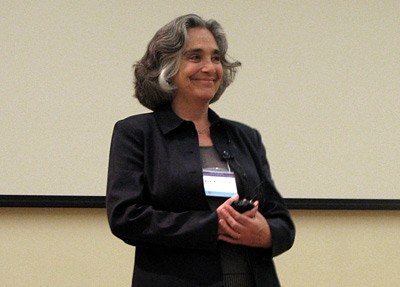Physicist Drell calls for scientists to act more selflessly — and broadly — in seeking science funding
By Lauren Gold
Take a look at the proposed funding for basic science research in legislation passed by both houses of Congress and requested by the White House over the last two years, and — if you happen to be a scientist — you might be a bit bewildered.
These documents seem to indicate happy news for researchers nationwide: significant and welcome increases in funding for fundamental research in the physical sciences. This, in accordance with a 2005 National Academy of Sciences report, "Rising Above the Gathering Storm: Energizing and Employing America for a Brighter Economic Future."
The catch? By the time the president signed the omnibus spending bills of 2007 and 2008, they contained only a fraction of the funding for science that had been promised.
Hence the title — and the punctuation — of Persis Drell's April 18 keynote address at Cornell's Appel Commons: "Science Funding: The Best of Times?" at the April 18-19 joint symposium of the New York state sections of the American Physical Society and the American Association of Physics Teachers. Drell is a professor of physics at Stanford and director of the Stanford Linear Accelerator (and a Cornell professor from 1988 to 2002).
More than 150 high school teachers, academic and industrial physicists and undergraduates attended the symposium, which was hosted by the Cornell Laboratory for Accelerator-based Science and Education.
While signs looked hopeful in the wake of the "Gathering Storm" report, Drell said, funding for basic science research has actually remained stagnant or fallen behind inflation -- casualties of the final budget authorization process.
"No one disputes it was a train wreck," Drell said. "Everyone I have spoken to is very, very angry about it. The White House and Congress are not working together, and science got caught in the crossfire."
The lack of adequate funding for basic science poses a major threat to the nation's ability to stay competitive, Drell said. But if government dysfunction is partly to blame for the quandary, she said, the research community must also do a better job of advocating for a budget that invests broadly across the sciences in basic research; mission-directed research (basic science conducted within a strategic framework); and applied research.
"Some investments have short-term, maybe less than five-year payoffs; some won't pay off for decades," she said. The invention of the transistor and MRI technology, she said, are just two of many examples of revolutionary applications that have their roots in fundamental research.
"Over and over, we see that it's transformative solutions that come out of a broad investment in research that really make huge changes in our society. We as a community have to do a better job of articulating those," she said.
And scientists must focus less on lobbying for their own narrow projects, she said, and more on emphasizing the importance of a broad national investment across disciplines.
"I believe a coherent advocacy is the only way that we will be able to succeed," she said. "We have to be willing to serve in the national advisory capacities and provide our best, wisest advice — not just on what is best for ourselves and our disciplines, but what is best for the national program as a whole ... We will all benefit if we all advocate a broader national commitment to scientific research and innovation."
While at Cornell, Drell also served as deputy director of Cornell's Laboratory of Nuclear Studies and as chair of the Synchrotron Radiation Committee.
Media Contact
Get Cornell news delivered right to your inbox.
Subscribe